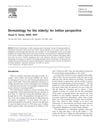 March 2005 in “International Journal of Cosmetic Science”
March 2005 in “International Journal of Cosmetic Science” DVI provides detailed 3D imaging of hair and shows how various products protect and enhance hair.

Skin changes throughout life, from development before birth to aging effects like wrinkles, influenced by both genetics and environment.
18 citations,
May 2014 in “International journal of pharmaceutics” Aging and sun damage do not increase the skin's absorption of certain sunscreens and drugs.

Cosmetics can help with mild skin problems and daily care but must be used carefully to avoid skin irritation.
 10 citations,
October 2017 in “Dermatologic clinics”
10 citations,
October 2017 in “Dermatologic clinics” Aging in men is influenced by genetics and lifestyle, leading to muscle loss, bone issues, and skin damage.
 September 1998 in “Journal of The European Academy of Dermatology and Venereology”
September 1998 in “Journal of The European Academy of Dermatology and Venereology” Aging affects hair density and skin health, and Behcet's disease, a complex condition with no specific test, involves sores and systemic issues, treated with various medications.
 July 2004 in “Clinics in Dermatology”
July 2004 in “Clinics in Dermatology” The Third World Congress of the International Academy of Cosmetic Dermatology discussed various topics like hair disorders, skin conditions, wound healing, shampoo technology, acne treatment, and the use of lasers in dermatology.
 3 citations,
September 2023 in “Skin research and technology”
3 citations,
September 2023 in “Skin research and technology” New treatments for skin damage from UV light using stem cells and their secretions show promise for skin repair without major risks.
 January 2016 in “SpringerBriefs in bioengineering”
January 2016 in “SpringerBriefs in bioengineering” Genetic defects and UV radiation cause skin damage and aging.
 39 citations,
June 2019 in “Toxins”
39 citations,
June 2019 in “Toxins” Bee venom might be a good alternative treatment for various skin conditions because it has many healing properties.
 32 citations,
November 2018 in “Anais Brasileiros de Dermatologia”
32 citations,
November 2018 in “Anais Brasileiros de Dermatologia” In Brazil in 2018, the most common skin issues were acne, photoaging, and nonmelanoma skin cancer, with treatments often including topical medications and sunscreen.
 January 2017 in “Clinical approaches and procedures in cosmetic dermatology”
January 2017 in “Clinical approaches and procedures in cosmetic dermatology” Certain nutrients can improve skin health and treat skin problems safely.
 July 2023 in “Photodermatology, Photoimmunology and Photomedicine”
July 2023 in “Photodermatology, Photoimmunology and Photomedicine” Infrared radiation can cause skin aging and cancer at high temperatures but may have therapeutic benefits at controlled levels.
34 citations,
June 2005 in “Journal of cosmetic dermatology” Medium-depth peels are safer and effective for improving skin appearance compared to deep peels.
 3 citations,
July 2020 in “Frontiers in Cell and Developmental Biology”
3 citations,
July 2020 in “Frontiers in Cell and Developmental Biology” Vitexin Compound 1 may help reduce skin aging caused by UVA light.
 1 citations,
June 2019 in “Food Research”
1 citations,
June 2019 in “Food Research” Tempeh oil rich in linoleic acid may protect against skin aging caused by UV light.
August 2022 in “Regenerative Medicine” Adipose-derived stem cells show promise for cosmetic treatments but need more research.
 138 citations,
May 2000 in “Maturitas”
138 citations,
May 2000 in “Maturitas” Estrogen replacement can improve skin health in menopausal women but doesn't reverse sun damage or prevent hair loss.
 September 1999 in “The Journal of The British Menopause Society”
September 1999 in “The Journal of The British Menopause Society” The document concludes that skin aging in women can be caused by UV exposure and hormonal changes, and treatments like hormone replacement therapy and various skin therapies can help.
 September 1998 in “Journal of The European Academy of Dermatology and Venereology”
September 1998 in “Journal of The European Academy of Dermatology and Venereology” Aging can lead to poorer scalp and hair health, including less hair and more scalp diseases, which should be managed to help older people feel better.
 April 2024 in “Dermatovenerologiâ, kosmetologiâ”
April 2024 in “Dermatovenerologiâ, kosmetologiâ” Actinic keratosis is a sun-induced skin condition that can potentially turn into skin cancer and requires various treatments to prevent this.
144 citations,
December 2017 in “Pigment cell & melanoma research” Melasma is now considered a skin aging disorder caused by sun exposure in people with a genetic tendency, which impacts treatment and prevention approaches.
 3 citations,
January 2011 in “Clinics in Dermatology”
3 citations,
January 2011 in “Clinics in Dermatology” The paper concludes that elderly in India face unique skin challenges and need better dermatological care and awareness.
 13 citations,
January 2018 in “Cellular Physiology and Biochemistry”
13 citations,
January 2018 in “Cellular Physiology and Biochemistry” Fat-derived stem cells can help protect and repair skin stem cells from aging caused by UV light.
 24 citations,
March 2015 in “Dermatologic Surgery”
24 citations,
March 2015 in “Dermatologic Surgery” Home-use cosmetic laser and light devices show modest results for hair removal and acne treatment, but more research is needed for confirmation.
 44 citations,
July 2015 in “JAMA Facial Plastic Surgery”
44 citations,
July 2015 in “JAMA Facial Plastic Surgery” Fractional laser resurfacing is effective and safe for skin treatment, with benefits like less downtime and a low risk of adverse events.
 April 2024 in “Dermatovenerologiâ, kosmetologiâ”
April 2024 in “Dermatovenerologiâ, kosmetologiâ” Actinic keratosis is a sun-induced skin condition that can potentially turn into skin cancer and requires treatment to prevent malignancy.
 December 2024 in “Biomaterials Research”
December 2024 in “Biomaterials Research” Exosomes from hair stem cells can reduce skin aging from UVB exposure.
Fractional laser resurfacing is effective for skin conditions, has lasting results, quick recovery, and is safe but requires careful consideration of risks.
 12 citations,
January 2016 in “Skin appendage disorders”
12 citations,
January 2016 in “Skin appendage disorders” Repeated botulinum toxin injections for forehead wrinkles may cause hairline recession in some women.

























